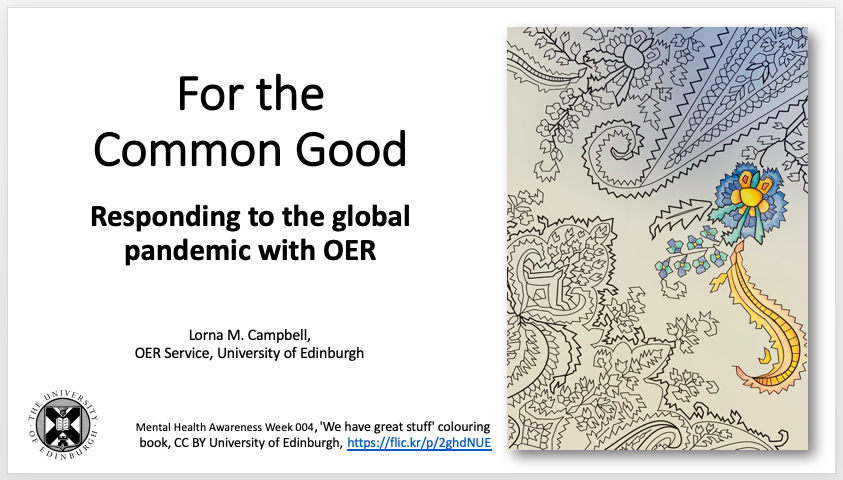 Last week I was delighted to see a project that I’ve been working on since the beginning of the year come to fruition with the publication of the Fundamentals of Music Theory open textbook on the University of Edinburgh Library’s new ebook platform Edinburgh Diamond. The open textbook was created by the the Open e-Textbooks for Access to Music Education project, which was funded by a University of Edinburgh Student Experience Grant. Led by Dr Nikki Moran and I, the project was a collaboration between the University’s OER Service, and staff and student interns, Kari Ding, Ifeanyichukwu Ezinmadu and Ana Reina Garcia, from the Reid School of Music.
Last week I was delighted to see a project that I’ve been working on since the beginning of the year come to fruition with the publication of the Fundamentals of Music Theory open textbook on the University of Edinburgh Library’s new ebook platform Edinburgh Diamond. The open textbook was created by the the Open e-Textbooks for Access to Music Education project, which was funded by a University of Edinburgh Student Experience Grant. Led by Dr Nikki Moran and I, the project was a collaboration between the University’s OER Service, and staff and student interns, Kari Ding, Ifeanyichukwu Ezinmadu and Ana Reina Garcia, from the Reid School of Music.
The aim of the project was to explore the creation of an open etextbook using existing content from the Reid School of Music’s Fundamentals of Music Theory course. This course covers the fundamentals of Western music theory, from absolute basics to more advanced concepts, and provides learners with the skills needed to read and write Western music notation, and to understand, analyse, and listen informedly. The course uses content originally created for a successful Coursera MOOC, in addition to new materials developed more recently for an on campus blended learning course, addressing global decolonisation issues around music theory and music education. These high-quality resources were ideally suited to further repurposing to create an open textbook, increasing the use of this tried-and-tested content, and making it available to teachers and learners in an accessible format ideally suited to hybrid and online learning.
The project provided us with an opportunity to evaluate a range of open textbook platforms and to gain valuable hands-on experience of the process and practicalities of creating an open textbook. This experience is particularly valuable at a time when universities are increasingly moving from print to digital textbooks and are facing rapidly rising textbook licensing costs. Open textbooks have the potential to benefit the University by reducing textbook costs, benefit staff by providing access to easily customisable open textbooks, and benefit students by providing free, high quality digital learning materials.
The project also enabled our student interns to develop valuable digital and copyright literacy skills including an understanding of open educational resources, open licenses and open etextbooks, familiarity with current etextbook applications, and experience of working with existing digital content and educational resources across a range of platforms.
One of the first tasks undertaken by the project was to evaluate a range of different hosting options for our ebook; Manifold, PressBooks, GitHub and the University Library’s new ebook platform, Edinburgh Diamond, based on Open Monograph Press. Balancing the pros and cons of each platform and considering the constraints of time and funding, we decided to publish our open textbook on Edinburgh Diamond. Open Access Publishing Officer Rebecca Wojturska, provided us with invaluable support in getting our textbook onto the platform and providing ISBN and DOIs.
The project wasn’t without it’s challenges; the whole project had to be undertaken online due to COVID-19 restrictions, some of our student interns were working in different time zones, and I had no prior experience of producing the ePub formats required by the ebook platform, so it was a steep learning curve on my part! I also had to dust off my rusty html and css skills which I haven’t used for years. Despite the challenges, the project successfully demonstrated that it is possible to take existing MOOC and on-campus course content and repurpose it into an open textbook.
All in all, this was a hugely rewarding project, not least because of the enthusiasm and dedication of the team at the Reid School of Music. It was a real joy to work with Nikki, Ana, Ifeanyichukwu and Kari. One of the high points of the project was listening to our student interns presenting about their work at the OERxDomains Conference – The Scale of Open: Re-purposing open resources for music education. Our talk was really well received, with lots of delegates commenting on how important it was to hear students’ voices. We learned a great deal from this small project and I hope that Fundamentals of Music Theory will be the first of many open textbooks published by staff and students across the University.
Fundamentals of Music Theory is shared under a Creative Commons Non-Commercial ShareAlike (CC BY-NC-SA 4.0) licence and can be downloaded from Edinburgh Diamond in the following formats: Word, PDF, EPub (reflowable), ePub (fixed layout). An HTML version will be available shortly. In order to make the open textbook as accessible and reusable as possible, users can download the book in its entirety, or topic by topic.
ISBN: 978-1-912669-22-6
DOI: https://doi.org/10.2218/ED.9781912669226
Header and cover image adapted from a free to use image by Geralt on Pixabay.









